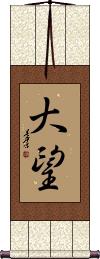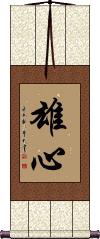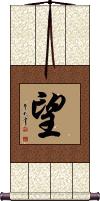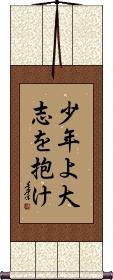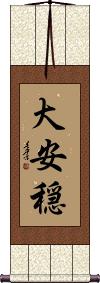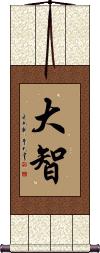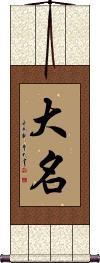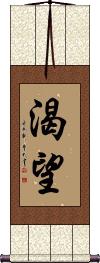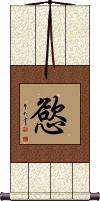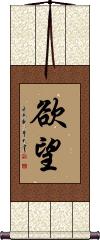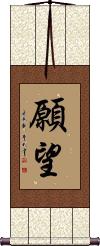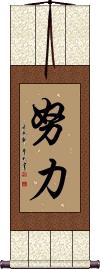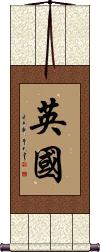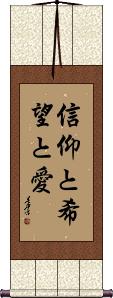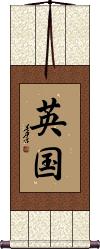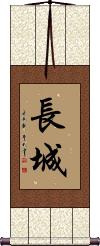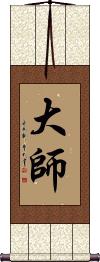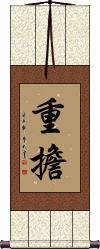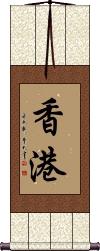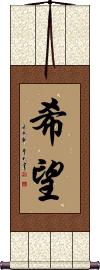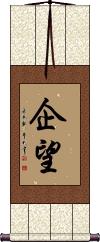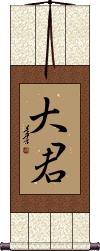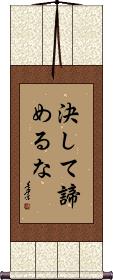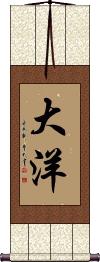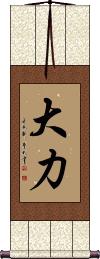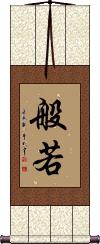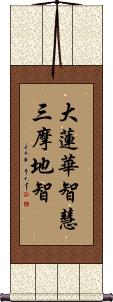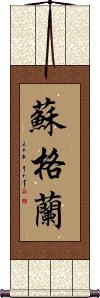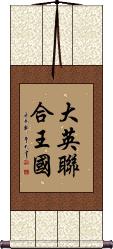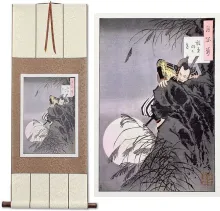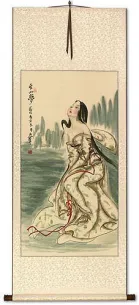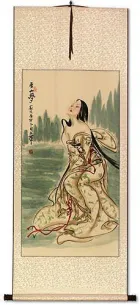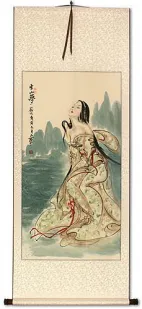Buy a Dream Chinese or Japanese Calligraphy Wall Scroll
We have many options to create artwork with the Chinese characters / Asian symbols / Japanese Kanji for Dream on a wall scroll or portrait.
In English, we use the word "dream" to mean both the illusions of sleep, and also our future hopes and ambitions. Both ideas are contained in the entries below:
2. Great Aspirations / Ambition
3. Heroic Spirit / Great Ambition
7. Great Peace
8. Great Wisdom
9. Great Illumination of Wisdom
10. The Great Path has No Gate
12. Desire
13. Desire / Longing / Craving
14. Desire / Craving
15. Desire / Wish / Aspiration
17. Great Endeavor / To Strive
18. England
19. Faith Hope Love
20. Falkland Islands
21. Gibraltar
22. Great Britain
24. Grand Master / Great Teacher
26. Hong Kong
27. Hope
29. Ireland
31. Never Give Up
32. Never Give In / Never Succumb / Never Lose
33. Northern Ireland
34. Great Sea
35. Great Power
36. Great Wisdom
37. Great Lotus Wisdom - Samadhi Wisdom
38. Scotland
39. United Kingdom
Big Dream / Great Hope
大望 is one of a few ways to write “dream big” in Japanese.
This is a good title if you want that to inspire ambition or high aspirations. 大望 is also a way to say “great expectations.”
Great Aspirations / Ambition
鴻鵠之誌 is a Chinese proverb that implies that having grand ambitions also means that others will not understand your great expectations and ideas.
Though the actual words come from a longer saying of Confucius, which goes, “The little swallows living under the eaves wouldn't understand the lofty ambitions of a swan (who flies far and wide).”
This Confucius quote has led to this idiomatic expression in China that means “think big.” What you'd be saying is “The lofty ambitions of a swan.”
Note that Chinese people sometimes refer to the little swallow as one who does not “think big” but is, instead, stuck in a rut or just leading a mundane life. Therefore, it's a compliment to be called a swan but not a good thing to be called a swallow.
Great Aspirations / Ambition
Heroic Spirit / Great Ambition
Great Ambitions
Brave the wind and the waves
乘風破浪 is a Chinese proverb that represents having great ambitions.
The British might say “to plough through.” Another way to understand it is “surmount all difficulties and forge ahead courageously.”
This can also be translated as “braving the wind and waves,” “to brave the wind and the billows,” “to ride the wind and crest the waves,” or “to be ambitious and unafraid.”
Literally, it reads: “ride (like a chariot) [the] wind [and] break/cleave/cut [the] waves,” or “ride [the] wind [and] slash [through the] waves.”
乘風破浪 is a great proverb to encourage yourself or someone else not to be afraid of problems or troubles, and when you have a dream, just go for it.
There is an alternate version, 長風破浪, but 乘風破浪 is far more common.
Great Expectations
望 holds the ideas of ambition, hope, desire, aspiring to, expectations, looking towards, to gaze (into the distance), and in some contexts, full moon rising.
望 is one of those single characters that is vague but in that vagueness, it also means many things.
望 is a whole word in Chinese and old Korean but is seldom seen alone in Japanese. Still, it holds the meanings noted above in all three languages.
Boys be Ambitious
Quote from William S. Clark in Japan
少年よ大志を抱け was a sort of motto or proverb invoked by William Clark after being hired by the Emperor of Japan in 1876 to establish a university in Hokkaido, Japan.
This phrase has been famous across all generations of Japan since that time.
More about William S. Clark's adventures in Japan.
Note: Because this selection contains some special Japanese Hiragana characters, it should be written by a Japanese calligrapher.
Great Peace
Great Wisdom
Great Illumination of Wisdom
The Great Path has No Gate
大道無門 is a Buddhist proverb that means “The Great Way has no entrance,” “The Great Way is gateless,” or “The Great Path lacks a gate.”
This can be translated in many other ways.
This concept was authored within a long sacred text by 無門慧開 (known as Wúmén Huìkāi in Chinese or Mumon Ekai in Japanese). He was a Chinese Chan Master (in Japanese, a Zen Master) who lived between 1183 and 1260 AD. His most famous work was a 48-koan collection titled “The Gateless Barrier” or “The Gateless Gate” (無門關 Wú Mén Guān in Chinese, or 無門関 Mu Mon Kan in Japanese). This calligraphy title is a notable line from this collection.
I like this reference to the source of this proverb: The Gateless Gate 無門關
Daimyo / Great Name
大名 is the title Daimyō in Japanese, which means “lord” or “great name.”
This has the same meaning in Chinese as “great name,” or “your distinguished name.” In ancient Japan, this referred to a feudal lord.
Also sometimes romanized from Japanese as Daimio, Daimyou, Oomiyou, or Oomyou.
Desire
This Chinese word can mean desirous, wishful, or desire.
The first character means to thirst for [something] or to be thirsty. The second character means to hope for, to expect, to gaze (into the distance), or to look for something. The combined meaning of these two characters changes a bit, but I think it's nice to know the individual meanings to give you a better understanding of where a word comes from.
Korean definitions of this word include craving, longing, and thirst for knowledge.
Desire / Longing / Craving
慾 means desire, longing, appetite, wish, covetousness, greed, passion, desire, avarice, and craving.
慾 is universal in Chinese, Japanese Kanji, and Korean Hanja.
The context in which this character is used determines whether the meaning is good or bad. As a single character on a wall scroll, you get to decide what the definition is to you (hopefully more toward desire than greed).
![]() Please note that Japanese use a simplified version of this character - it also happens to be the same simplification used in mainland China. Click on the character to the right if you want the Japanese/Simplified version of desire.
Please note that Japanese use a simplified version of this character - it also happens to be the same simplification used in mainland China. Click on the character to the right if you want the Japanese/Simplified version of desire.
Desire / Craving
欲望 is a word that means strong desire, while some might translate it as “lust.”
The first character of this word means desire, longing, hunger, covetousness, greed, passion, desire, craving, or wish. The second character means to hope for, ambition, desire, aspire, expect, gaze (into the distance), or look for something.
Desire / Wish / Aspiration
Door of Great Wisdom
Great Endeavor / To Strive
努力 means great effort; to strive; to try hard; great effort; great exertion; great endeavor (endeavour); great effort; to strive.
This “striving endeavor” word is valid in Chinese, Japanese Kanji, and old Korean Hanja.
England
This is the Chinese name for the country of England.
See Also: Great Britain | United Kingdom | Ireland | Scotland | Northern Ireland | Europe
Faith Hope Love
Faith Hope Love
信仰と希望と愛 is a Japanese list of words (not really a phrase) meaning faith, hope, and love.
Some have associated this word list with Corinthians 13:13, though there are no specific religious connotations in this word list, and it's not directly from that Japanese Bible verse.
Note: Because this selection contains some special Japanese Hiragana characters, it should be written by a Japanese calligrapher.
Falkland Islands
This is the Chinese name for the Falkland Islands (overseas territory of the United Kingdom).
See Also: Great Britain | United Kingdom | Africa
Gibraltar
This is the Chinese name for Gibraltar (territory of the United Kingdom but also claimed by Spain).
See Also: Great Britain | Spain | Europe
Great Britain
This is the Chinese name for Great Britain.
See Also: England | United Kingdom | Scotland | Ireland | Europe
Great Britain
The Great Wall of China
長城 is the Chinese name for the Great Wall.
Built at the northern border of China to protect from Mongol attack.
Notes:
In Japanese, this can be a surname Nagaki. Japanese often use a longer title for the Great Wall of China.
In Korean, this refers to Changsŏng (a city in Changsŏng-kun county, Chŏllanam-to province).
The Great Wall of China
Grand Master / Great Teacher
大師 is a way to title a great master, grand master, or great teacher.
This can be used in the context of martial arts or a Buddhist teacher. Thus, it can be used to title a living Buddha, Bodhisattva, or high-ranking monk.
Great Responsibility
Hong Kong
This is the Chinese and Japanese name for the Special Administrative Region (SAR) of The Peoples Republic of China known as Hong Kong (formerly a British administrated territory).
The romanization “Hong Kong” is probably a British approximation of the Cantonese pronunciation for this land.
See Also: Great Britain | China | Macao | Taiwan | Singapore | Japan | Vietnam | Korea | Asia
Hope
Looking Forward / Hoping
企望 is a Chinese and Japanese word that can be translated as:
to hope; to look forward; looking forward to; hoping for.
The first character means to plan. The second can mean to hope; to expect; to gaze (into the distance); to look towards. Sometimes it can mean a full moon.
Together, these characters create this word about hoping, wishing, looking forward, and dreaming about the future.
Ireland
This is the Chinese name for the country of Ireland.
See Also: Northern Ireland | Great Britain | England | Scotland | United Kingdom | Europe
Great Lord / Tycoon
大君 is the Japanese word Taikun. It's defined directly as liege, lord, or an alternate title for a shogunate.
The sound of this Japanese word entered the English lexicon by the 1800s but took the spelling of “tycoon.” Even President Lincoln was referred to as a Tycoon in the 1860s.
In Japan, this is still understood as “Great Lord” or “Big Boss.” In America, it means “Bill Gates” and “Warren Buffet.”
Never Give Up
The first character means “eternal” or “forever,” and the second means “not” (together, they mean “never”). The last two characters mean “give up” or “abandon.” Altogether, you can translate this proverb as “never give up” or “never abandon.”
Depending on how you want to read this, 永不放棄 is also a statement that you will never abandon your hopes, dreams, family, or friends.
Never Give In / Never Succumb / Never Lose
決して諦めるな is a Japanese term that informally means “never give up.”
It's also a Japanese way to say “never surrender.”
Note: Because this selection contains some special Japanese Hiragana characters, it should be written by a Japanese calligrapher.
See Also: Tenacity | Perseverance | Hope
Northern Ireland
This is the Chinese name for the country of Northern Ireland.
See Also: Ireland | United Kingdom | Great Britain | Europe
Great Sea
This is a rarely-used word for ocean in Japanese, Chinese, and Korean. This is here mostly for reference - please order a different ocean for your custom calligraphy wall scroll.
The first character means “big” or “great.”
The second means “ocean” or “body of water” (it can sometimes mean “foreign” but not in this case).
The first character designates that you are talking about a great or huge body of water (certainly a major ocean and not a smaller sea).
Great Power
Great Wisdom
Prajñā
般若 means great wisdom or wondrous knowledge.
In the Buddhist context, this is prajna or prajñā, to know, to understand, to have the wisdom required to attain enlightenment.
Since this is a wisdom that transcends the realm of logic, the pure, absolute wisdom beyond the reach of words and concepts, it is not obtained through learning but is realized for the first time through a religious experience.
Great Lotus Wisdom - Samadhi Wisdom
Scotland
蘇格蘭 is the Chinese name for Scotland.
See Also: Great Britain | United Kingdom | England | Northern Ireland | Ireland | Europe
United Kingdom
大英聯合王國 is the Chinese name for the United Kingdom.
See Also: Great Britain | England | Scotland | Ireland | Europe
United Kingdom
This is the most common Japanese name for the United Kingdom.
See Also: Great Britain | England | Scotland | Ireland | Europe
I Climbed the Great Wall
登长城 means to ascend or to climb the Great Wall of China.
登長城 is the poetic and native way to express this feat.
登 means “to ascend” and is a classical verb used in inscriptions, poems, and calligraphy.
长城 is the title of the Great Wall.
This three-character phrase is concise and implies achievement rather than casual travel.
This in-stock artwork might be what you are looking for, and ships right away...
The following table may be helpful for those studying Chinese or Japanese...
| Title | Characters | Romaji (Romanized Japanese) | Various forms of Romanized Chinese | |
| Big Dream Great Hope | 大望 | tai mou / taimou / tai mo | ||
| Great Aspirations Ambition | 鴻鵠之誌 鸿鹄之志 | hóng hú zhī zhì hong2 hu2 zhi1 zhi4 hong hu zhi zhi honghuzhizhi | hung hu chih chih hunghuchihchih |
|
| Great Aspirations Ambition | 大志を抱 | tai shi wo idaku taishiwoidaku | ||
| Heroic Spirit Great Ambition | 雄心 | yuushin / yushin | xióng xīn xiong2 xin1 xiong xin xiongxin | hsiung hsin hsiunghsin |
| Great Ambitions | 乘風破浪 乘风破浪 | chéng fēng pò làng cheng2 feng1 po4 lang4 cheng feng po lang chengfengpolang | ch`eng feng p`o lang chengfengpolang cheng feng po lang |
|
| Great Expectations | 望 | bou / nozomi bo / nozomi | wàng / wang4 / wang | |
| Boys be Ambitious | 少年よ大志を抱け | shou nen yo tai shi o ida ke shounenyotaishioidake sho nen yo tai shi o ida ke | ||
| Great Peace | 大安穏 | daiannon | ||
| Great Wisdom | 大智 | daichi | dà zhì / da4 zhi4 / da zhi / dazhi | ta chih / tachih |
| Great Illumination of Wisdom | 大智明 | dai chi myou daichimyou dai chi myo | dà zhì míng da4 zhi4 ming2 da zhi ming dazhiming | ta chih ming tachihming |
| The Great Path has No Gate | 大道無門 大道无门 | dai dou mu mon daidoumumon dai do mu mon | dà dào wú mén da4 dao4 wu2 men2 da dao wu men dadaowumen | ta tao wu men tataowumen |
| Daimyo Great Name | 大名 | dai myou / daimyou / dai myo | dà míng / da4 ming2 / da ming / daming | ta ming / taming |
| Desire | 渴望 | kě wàng / ke3 wang4 / ke wang / kewang | k`o wang / kowang / ko wang | |
| Desire Longing Craving | 慾 欲 | yoku | yù / yu4 / yu | yü |
| Desire Craving | 欲望 | yokubou / yokubo | yù wàng / yu4 wang4 / yu wang / yuwang | yü wang / yüwang |
| Desire Wish Aspiration | 願望 愿望 | gan bou / ganbou / gan bo | yuàn wàng yuan4 wang4 yuan wang yuanwang | yüan wang yüanwang |
| Door of Great Wisdom | 大智慧門 大智慧门 | dai chi e mon daichiemon | dà zhì huì mén da4 zhi4 hui4 men2 da zhi hui men dazhihuimen | ta chih hui men tachihhuimen |
| Great Endeavor To Strive | 努力 | doryoku / doryoku | nǔ lì / nu3 li4 / nu li / nuli | |
| England | 英國 英国 | yīng guó / ying1 guo2 / ying guo / yingguo | ying kuo / yingkuo | |
| Faith Hope Love | 信望愛 信望爱 | xìn wàng ài xin4 wang4 ai4 xin wang ai xinwangai | hsin wang ai hsinwangai |
|
| Faith Hope Love | 信仰と希望と愛 | shinkou to kibou to ai shinkoutokiboutoai shinko to kibo to ai | ||
| Falkland Islands | 福克蘭群島 福克兰群岛 | fú kè lán qún dǎo fu2 ke4 lan2 qun2 dao3 fu ke lan qun dao fukelanqundao | fu k`o lan ch`ün tao fukolanchüntao fu ko lan chün tao |
|
| Gibraltar | 直布羅陀 直布罗陀 | zhí bù luō tuó zhi2 bu4 luo1 tuo2 zhi bu luo tuo zhibuluotuo | chih pu lo t`o chihpuloto chih pu lo to |
|
| Great Britain | 大不列顛 大不列颠 | dà bù liè diān da4 bu4 lie4 dian1 da bu lie dian dabuliedian | ta pu lieh tien tapuliehtien |
|
| Great Britain | 英國 英国 | ei koku / eikoku | ||
| The Great Wall of China | 長城 长城 | chou jou / choujou / cho jo | cháng chéng chang2 cheng2 chang cheng changcheng | ch`ang ch`eng changcheng chang cheng |
| The Great Wall of China | 万里の長城 | ban ri no chou jou banrinochoujou ban ri no cho jo | ||
| Grand Master Great Teacher | 大師 大师 | daishi | dà shī / da4 shi1 / da shi / dashi | ta shih / tashih |
| Great Responsibility | 重擔 重担 | juu tan / juutan / ju tan | zhòng dàn zhong4 dan4 zhong dan zhongdan | chung tan chungtan |
| Hong Kong | 香港 | hon kon / honkon | xiāng gǎng xiang1 gang3 xiang gang xianggang | hsiang kang hsiangkang |
| Hope | 希望 | ki bou / kibou / ki bo | xī wàng / xi1 wang4 / xi wang / xiwang | hsi wang / hsiwang |
| Looking Forward Hoping | 企望 | kibou / kibo | qǐ wàng / qi3 wang4 / qi wang / qiwang | ch`i wang / chiwang / chi wang |
| Ireland | 愛爾蘭 爱尔兰 | ài ěr lán ai4 er3 lan2 ai er lan aierlan | ai erh lan aierhlan |
|
| Great Lord Tycoon | 大君 | tai kun / taikun | ||
| Never Give Up | 永不放棄 永不放弃 | yǒng bù fàng qì yong3 bu4 fang4 qi4 yong bu fang qi yongbufangqi | yung pu fang ch`i yungpufangchi yung pu fang chi |
|
| Never Give In Never Succumb Never Lose | 決して諦めるな | kesshite akirameruna kesshiteakirameruna keshite akirameruna | ||
| Northern Ireland | 北愛爾蘭 北爱尔兰 | běi ài ěr lán bei3 ai4 er3 lan2 bei ai er lan beiaierlan | pei ai erh lan peiaierhlan |
|
| Great Sea | 大洋 | tai you / taiyou / tai yo | dà yáng / da4 yang2 / da yang / dayang | ta yang / tayang |
| Great Power | 大力 | dai riki / dairiki | dà lì / da4 li4 / da li / dali | ta li / tali |
| Great Wisdom | 般若 | hannya | bō rě / bo1 re3 / bo re / bore | po je / poje |
| Great Lotus Wisdom - Samadhi Wisdom | 大蓮華智慧三摩地智 大莲华智慧三摩地智 | dai renge chie sanmajichi dairengechiesanmajichi | dà lián huá zhì huì sān mó dì zhì da4 lian2 hua2 zhi4 hui4 san1 mo2 di4 zhi4 da lian hua zhi hui san mo di zhi | ta lien hua chih hui san mo ti chih |
| Scotland | 蘇格蘭 苏格兰 | sū gé lán su1 ge2 lan2 su ge lan sugelan | su ko lan sukolan |
|
| United Kingdom | 大英聯合王國 大英联合王国 | dài yīng lián hé wáng guó dai4 ying1 lian2 he2 wang2 guo2 dai ying lian he wang guo daiyinglianhewangguo | tai ying lien ho wang kuo taiyinglienhowangkuo |
|
| United Kingdom | 連合王國 連合王国 | rengououkoku / rengookoku rengokoku / rengokoku | ||
| I Climbed the Great Wall | 登長城 登长城 | dēng cháng chéng deng1 chang2 cheng2 deng chang cheng dengchangcheng | teng ch`ang ch`eng tengchangcheng teng chang cheng |
|
| In some entries above you will see that characters have different versions above and below a line. In these cases, the characters above the line are Traditional Chinese, while the ones below are Simplified Chinese. | ||||
